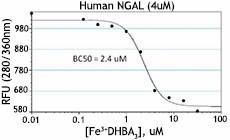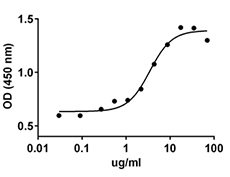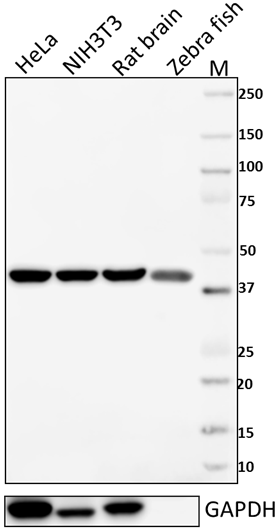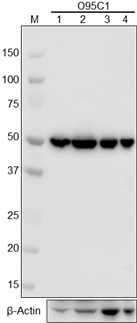- Regulatory Status
- RUO
- Other Names
- Lipocalin 2, LCN2, Siderocalin
- Ave. Rating
- Submit a Review
- Product Citations
- publications

-

Binding activity of hNGAL
NGAL, also known as lipocalin 2, LCN2, and siderocalin, is a small molecule composed of 178 amino acids. It belongs to the lipocalin superfamily of 20 structurally related secreted proteins. Members of the lipocalin family share a highly conserved fold with an eight stranded antiparallel β barrel, and act as a transporter, carrying small molecules to specific cells. NGAL occurs predominantly in a monomeric form, with a small percentage occurring as a dimer or trimer. It was originally identified as a 25 kD protein covalently bound to gelatinase from human neutrophils. It is a critical component of innate immunity because its ability to bind iron-siderophore complexes limits bacterial growth. Human NGAL is expressed at very low levels in human tissues, including kidney, trachea, lungs, stomach, and colon, and its expression increases greatly in the presence of inflammation and injured epithelia. In addition to its role in innate immunity, it is a promising biomarker for acute kidney injury that is beginning to be used in clinical practice in addition to research studies.
Product DetailsProduct Details
- Source
- Human NGAL, amino acids (Gln21-Gly198) (Accession# NP_005555) was expressed with C-terminal His 10 tag in 293E cell line.
- Molecular Mass
- The 193 amino acid recombinant protein has a predicted molecular mass of approximately 22 kD. The DTT-reduced and non-reduced protein migrate at approximately 24-28 and 23-26 kD by SDS-PAGE respectively. The N-terminal amino acid is blocked.
- Purity
- >95%, as determined by Coomassie stained SDS-PAGE.
- Formulation
- 0.22 µm filtered protein solution is in PBS.
- Endotoxin Level
- Less than 0.01 ng per µg cytokine as determine by the LAL method.
- Concentration
- 10 and 25 µg sizes are bottled at 200 µg/mL. 100 µg size and larger sizes are lot-specific and bottled at the concentration indicated on the vial. To obtain lot-specific concentration and expiration, please enter the lot number in our Certificate of Analysis online tool.
- Storage & Handling
- Unopened vial can be stored between 2°C and 8°C for up to 2 weeks, at -20°C for up to six months, or at -70°C or colder until the expiration date. For maximum results, quick spin vial prior to opening. The protein can be aliquoted and stored at -20°C or colder. Stock solutions can also be prepared at 50 - 100 µg/mL in appropriate sterile buffer, carrier protein such as 0.2 - 1% BSA or HSA can be added when preparing the stock solution. Aliquots can be stored between 2°C and 8°C for up to one week and stored at -20°C or colder for up to 3 months. Avoid repeated freeze/thaw cycles.
- Activity
- EC50 ≥ 1.2 µM, by dose dependent binding of the protein with [ Fe3+(DHBA)3] complex.
- Application
-
Bioassay
- Application Notes
-
BioLegend carrier-free recombinant proteins provided in liquid format are shipped on blue-ice. Our comparison testing data indicates that when handled and stored as recommended, the liquid format has equal or better stability and shelf-life compared to commercially available lyophilized proteins after reconstitution. Our liquid proteins are verified in-house to maintain activity after shipping on blue ice and are backed by our 100% satisfaction guarantee. If you have any concerns, contact us at tech@biolegend.com.
Antigen Details
- Structure
- Monomer
- Distribution
- Secreted by epithelial cells, macrophages, neutrophils; increased levels have been observed in plasma, serum, and urine in various conditions such as metastatic breast and colorectal cancer, acute kidney injury, pacreatitis and preeclampsia
- Function
- Apoptosis, Innate immunity, renal development
- Interaction
- Macrophages, neutrophils
- Ligand/Receptor
- SLC22A17 (24p3R)
- Biology Area
- Angiogenesis, Apoptosis/Tumor Suppressors/Cell Death, Cell Biology, Immunology, Innate Immunity, Signal Transduction
- Antigen References
-
1. Kjeldsen L, et al. 1993. J. Biol. Chem. 268:10426.
2. Goetz DH, et al. 2002. Mol. Cell 10:1033.
3. Yang MB, et al. 2002. Mol. Cell 10:1045.
4. Flo TH, et al. 2004. Nature 432:917.
5. Tsigou E, et al. 2013. Crit. Care Res. Pract. 2013:361078.
6. Leung L, et al. 2012. PLoS One 7:e46677. - Gene ID
- 3934 View all products for this Gene ID
- UniProt
- View information about NGAL on UniProt.org
Related Pages & Pathways
Pages
Related FAQs
- Why choose BioLegend recombinant proteins?
-
• Each lot of product is quality-tested for bioactivity as indicated on the data sheet.
• Greater than 95% Purity or higher, tested on every lot of product.
• 100% Satisfaction Guarantee for quality performance, stability, and consistency.
• Ready-to-use liquid format saves time and reduces challenges associated with reconstitution.
• Bulk and customization available. Contact us.
• Learn more about our Recombinant Proteins. - How does the activity of your recombinant proteins compare to competitors?
-
We quality control each and every lot of recombinant protein. Not only do we check its bioactivity, but we also compare it against other commercially available recombinant proteins. We make sure each recombinant protein’s activity is at least as good as or better than the competition’s. In order to provide you with the best possible product, we ensure that our testing process is rigorous and thorough. If you’re curious and eager to make the switch to BioLegend recombinants, contact your sales representative today!
- What is the specific activity or ED50 of my recombinant protein?
-
The specific activity range of the protein is indicated on the product datasheets. Because the exact activity values on a per unit basis can largely fluctuate depending on a number of factors, including the nature of the assay, cell density, age of cells/passage number, culture media used, and end user technique, the specific activity is best defined as a range and we guarantee the specific activity of all our lots will be within the range indicated on the datasheet. Please note this only applies to recombinants labeled for use in bioassays. ELISA standard recombinant proteins are not recommended for bioassay usage as they are not tested for these applications.
- Have your recombinants been tested for stability?
-
Our testing shows that the recombinant proteins are able to withstand room temperature for a week without losing activity. In addition the recombinant proteins were also found to withstand four cycles of freeze and thaw without losing activity.
- Does specific activity of a recombinant protein vary between lots?
-
Specific activity will vary for each lot and for the type of experiment that is done to validate it, but all passed lots will have activity within the established ED50 range for the product and we guarantee that our products will have lot-to-lot consistency. Please conduct an experiment-specific validation to find the optimal ED50 for your system.
- How do you convert activity as an ED50 in ng/ml to a specific activity in Units/mg?
-
Use formula Specific activity (Units/mg) = 10^6/ ED50 (ng/mL)
 Login / Register
Login / Register 














Follow Us